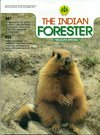Rapid Appraisal of Manas Tiger Reserve to understand its Conservation Challenges
DOI:
https://doi.org/10.36808/if/2018/v144i10/139585Keywords:
Manas Tiger Reserve, Conservation Challenges, Transboundary Conservation Area, World Heritage Site, Manas National ParkAbstract
The authors present an analysis of the prevalent conservation challenges in Manas Tiger Reserve and World Heritage Site, together with the Transboundary Conservation Area, as discerned utilising four distinct techniques: literature survey, field visits, participatory appraisal of key stakeholders and focussed interviews. They found significant differences in the challenge perceptions of different stakeholders, indicating not only availability heuristic in operation, but also the complimentary strategies that need to be deployed for an ameliorated participatory management. They believe that the information presented through this analysis will be found useful by the managers for an expeditious mitigation of these conservation challenges, so obligatory for the management of this exceptional biodiversity hotspot.References
Allan J.R., Venter O., Maxwell S., Bertzky B., Jones K., Shi Y. and Watson J. E. (2017). "Recent increases in human pressure and forest loss threaten many Natural World Heritage Sites. Biological conservation, 206: 47-55.
Allen D.J., Molur S. and Daniel B.A. (2010). The Status and Distribution of Freshwater Biodiversity in the Eastern Himalaya, IUCN, International Union for Conservation of Nature and Natural Resources.
Badman T. and Bomhard B. (2008). "World Heritage and Protected Areas."Gland (IUCN).
Barman R., Choudhury B., Ashraf N. and Menon V. (2014). "Rehabilitation of greater one-horned rhinoceros calves in Manas National Park, a World Heritage Site in India. Pachyderm, 55: 78-88.
Bonal B.S., Talukdar B.K. and Sharma A. (2009). "Translocation of Rhino in Assam.Tiger Paper, 36(1).
Ghosh S., Lahkar B.P., Das A.C. and Swargiary A. (2014). Tiger Conservation Plan Manas Tiger Reserve (2014 to 2024), Field Directorate, Manas Tiger Project, Government of Assam.
Goswami R. and Ganesh T. (2011). "Conservation amidst political unrest: the case of Manas National Park, India. Current Science, 100(4): 445-446.
Mittermeier R.A., Myers N., Thomsen J.B., Da Fonseca G.A. and Olivieri S. (1998). "Biodiversity hotspots and major tropical wilderness areas: approaches to setting conservation priorities. Conservation Biology, 12(3): 516-520.
Nath N.K., Lahkar B.P., Brahma N., Dey S., Das J.P., Sarma P.K. and Talukdar B.K. (2009). "An assessment of human-elephant conflict in Manas National Park, Assam, India. Journal of Threatened Taxa, 1(6): 309-316.
Omidi A., Naeemipoor H. and Hosseini M. (2012). "Plastic debris in the digestive tract of sheep and goats: An increasing environmental contamination in Birjand, Iran. Bulletin of environmental contamination and toxicology, 88(5): 691-694.
Pandit M., Sodhi N.S., Koh L.P., Bhaskar A. and Brook B.W. (2007). "Unreported yet massive deforestation driving loss of endemic biodiversity in Indian Himalaya. Biodiversity and Conservation, 16(1): 153-163.
Price T.D., Hooper D.M., Buchanan C.D., Johansson U.S., Tietze D.T., Alström P., Olsson U., Ghosh-Harihar M., Ishtiaq F. and Gupta S.K. (2014). "Niche filling slows the diversification of Himalayan songbirds. Nature, 509(7499): 222.
Ramaswamy V. and Sharma H.R. (2011). "Plastic bags–Threat to environment and cattle health: A retrospective study from Gondar City of Ethiopia.The IIOAB Journal, 2(1): 7-12.
Singh S.P., Sharma A. and Talukdar B.K. (2012). "Translocation of Rhinos within Assam: A successful third round of the second phase of translocations under Indian Rhino Vision (IRV) 2020."
Smith G., Jakubowska J. and May I. (2000). "A global overview of protected areas on the World Heritage list of particular importance for biodiversity."
Soud R., Talukdar S. and Dey K. (2013). "Conservation challenges of Manas Tiger reserve: political unrest and community attitude."The Clarion, 2(1): 59-63.
Downloads
Downloads
Published
How to Cite
Issue
Section
License
Unless otherwise stated, copyright or similar rights in all materials presented on the site, including graphical images, are owned by Indian Forester.





